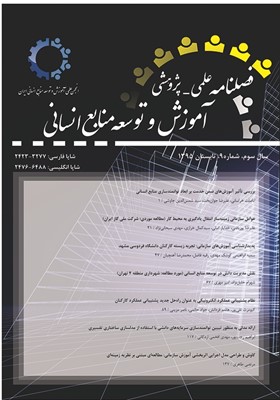عوامل سازمانی زمینه¬ساز انتقال یادگیری به محیط کار (مطالعه موردی؛ شرکت ملي گاز ايران)
محورهای موضوعی :علیرضا یوزباشی 1 , خدایار ابیلی 2 , سید کمال خرازی 3 , مهدی سبحانی نژاد 4
1 - علوم تربیتی
2 - علوم تربیتی
3 - دانشگاه تهران
4 - دانشگاه شاهد
کلید واژه: عوامل سازماني, انتقال يادگيري, محيط کار, شرکت ملي گاز ايران,
چکیده مقاله :
پژوهش حاضر به شناسايي عوامل سازماني زمینه ساز انتقال يادگيري به محيط کار در شرکت ملي گاز ايران با استفاده از رویکرد کیفی و روش مطالعه موردی صورت گرفت. به منظور گردآوری داده ها از مصاحبه نیمهساختار یافته استفاده شد. جامعه پژوهش شامل خبرگان دانشگاهي، مديران و معاونان منابع انساني و آموزشي شرکت ملي گاز ايران بوده که با توجه به سطح اشباع دادهها، 16 نفر از آنها به صورت هدفمند انتخاب شدند. براي تحليل دادهها از فن تحليل موضوعي (تم) استفاده شد و روايي يافتههاي پژوهش با استفاده از روشهاي بررسي توسط اعضاء و چندسويهنگري منابع دادهها تضمين گرديد. همچنين، به منظور سنجش پايايي کدگذاريهاي انجام شده، از روشهاي پايايي باز آزمون و توافق درون موضوعي استفاده شد. پس از مرور و سازماندهي متون مصاحبهها، محقق کدها يا مفاهيم اوليه را شناسايي و در ادامه کدهاي مشابه در طبقههايي خاص قرار گرفتند. سپس، براي هر يک از اين طبقات عناويني، که نمايانگر کل کدهاي آن طبقه باشند، انتخاب گرديد و در نتيجه، مقوله هاي اصلي سازماني اثرگذار بر انتقال يادگيري به محيط کار در شرکت ملي گاز ايران شناسايي شد که شامل؛ فرهنگ سازماني، جو سازماني، حمايت سازمانی، پیامد سازمانی، مديريت عملکرد، عدالت سازماني، خصیصه های مدير مستقیم، مشارکت در تصميمگيري، محيط يادگيرنده، فرصت کاربرد و تناسب شغل و شاغل مي باشد.
This study identifies effective organizational factors on transferring learning to workplace at National Iranian Gas Company. Research method is qualitative with the approach of focus group. The population included academic experts, managers, and deputies of human resources and education of NIGC. Depth interviews were conducted with 16 people of them with purposive sampling method. For data analysis, thematic analysis (theme) was used. The validity of the findings was guaranteed using survey methods by the members and multilateral review of data resources. In order to assess the reliability of codes, retest reliability and agreement within the thematic approach were used. After reviewing and organizing interviews, the researcher identified codes or primary concepts and they were classified with similar codes. Titles showing the total codes of that category were selected for each of them. As a result, main effective organizational factors on transferring learning to the workplace at NIGC were detected as follows: organizational culture, organizational climate, organizational support, organizational outcome, performance management, organizational justice, Features of direct manager, participation in decision-making, learner environment, application opportunity and the proportion of occupation and employee.
